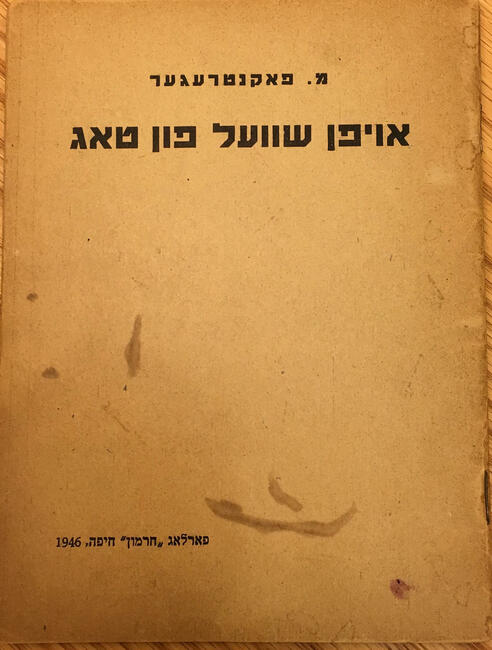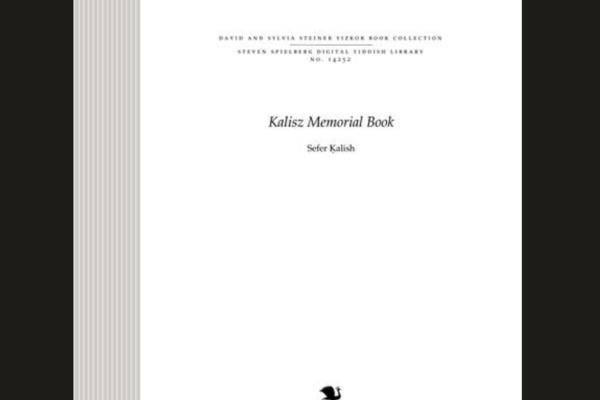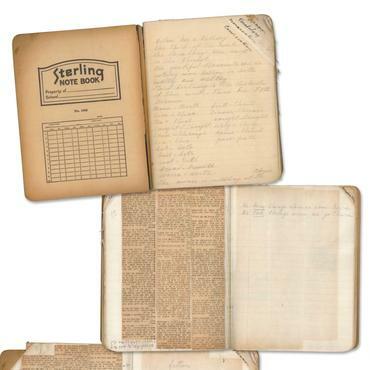The Story of M. Pakntreger
An Author by the Name of 'Book Peddler'
Yiddish culture is full of pakn tregers (book peddlers.) Pakn tregers traveled from shtetl to shetl in Eastern Europe bringing books and news of the world. The pseudonym of writer Sholem Yankev Abramovitsh, the grandfather of modern Yiddish literature, is Mendele Moykher Sforim—meaning Mendele the Book Peddler.
And the Yiddish Book Center's English-language magazine is called Pakn Treger.
So you can imagine our delight when, as we unpacked a box of recently donated books, we came across a small, slim volume of poetry titled Afn shvel fun tog (On Day’s Threshold), penned by a mysterious M. Pakntreger!

A quick search in the New Lexicon of Yiddish Writers provided us with his first name. Meyer Pakntreger was born on March 3, 1914 in Kalisz, Poland, a city with a thriving Jewish population of 30,000 and a vibrant cultural life—a city where one could find local Yiddish newspapers and journals. The city was home to editors and poets, visiting theater troupes, and a famed conductor. Later, after so much of Kalisz was destroyed in the khurbn, Pakntreger wrote essays for the Kalisz Yizkor book Sefer kalish.
According to his Lexicon entry, Pakntreger studied in heder (traditional religious school), completed an artisan’s education in lock-making, and studied for a year at Warsaw Polytechnic. His early heder and religious upbringing inform Pakntreger’s writing, which is peppered with religious metaphor and loshn-koydesh "holy-tongue," which he used to most striking effect in the Kalisz Yizkor book at the beginning of his personal elegy for his lost home:
“Like the High Priest preparing to do his holy work in the Temple—I take off my shoes before you, Kalisz, my hometown, as I perform my sacred duty: to illustrate you and to recount you in my memories." (Sefer kalish 509; translated by the authors)
The poetry in Afn shvel fun tog (On Day’s Threshold), published in Haifa in 1946, reflects that same depth of grief:
Desire
Night filled with moonlight and stardust
Listen to my quiet lust!
Take me into your shrine
Of starlight and moonshine,
And my ray of light will fall, like dew
Upon hundreds of miles
And illuminate the fish in the stream,
And the Jew on his wandering way
Through grayish, darkish days,
Fleeing the German regime. (Afn shvel fun tog 16; translated by the authors)
But there are also hints of joy throughout his memorials. He brings the characters of his youth to life in all their raucous, pious, ordinary, inspired, prickly glory—unable, he writes, to reconcile the thought that he would never again hear their laughter, learning, or song. And one of these Kaliszer characters in Pakntreger’s prose, has a familiar title: book peddler!
In an essay in the Kalisz Yizkor book recalling the days leading up to Rosh Hashanah, Pakntreger describes how Jews would come from far and wide to spend the Days of Awe in Kalisz. One of these visitors is Reb Leybush Hersh moykher-sforim, the book peddler. Meyer Pakntreger, the book peddler in name but not vocation, remembers how this professional book peddler would wait outside the great synagogue during the special slikhes service Jews say before Rosh Hashanah. When the service ended, he would advertise his wares to the exiting crowd: taleysim (prayer shawls) large and small, tales bags, sidurim (prayer books), and makhzoyrim (high holiday prayer books). According to our Pakntreger, the Jews of Kalisz were all familiar with this book peddler, and each would be sure to do a mitzvah and buy something on their way out the door. In this way, Reb Leybush Hersh the book peddler would always begin the new year with a boost to his business.
Meyer Pakntreger survived the war and carried his memories of Kalisz along with him. The poet spent the early years of World War II in a workers’ camp in the Soviet Union and emigrated to Palestine in 1942, where he worked first on a kibbutz, then in a factory. He lived there until his death on December 18, 1960.
We're always eager for the chance to learn about the people behind the books on our shelves. The discovery of a small book penned by Meyer Pakntreger provided us with the opportunity to learn about this otherwise unknown writer and also the chance to celebrate those for whom our magazine, Pakn Treger, is named!
—Sophia Shoulson and Sasha Stern



